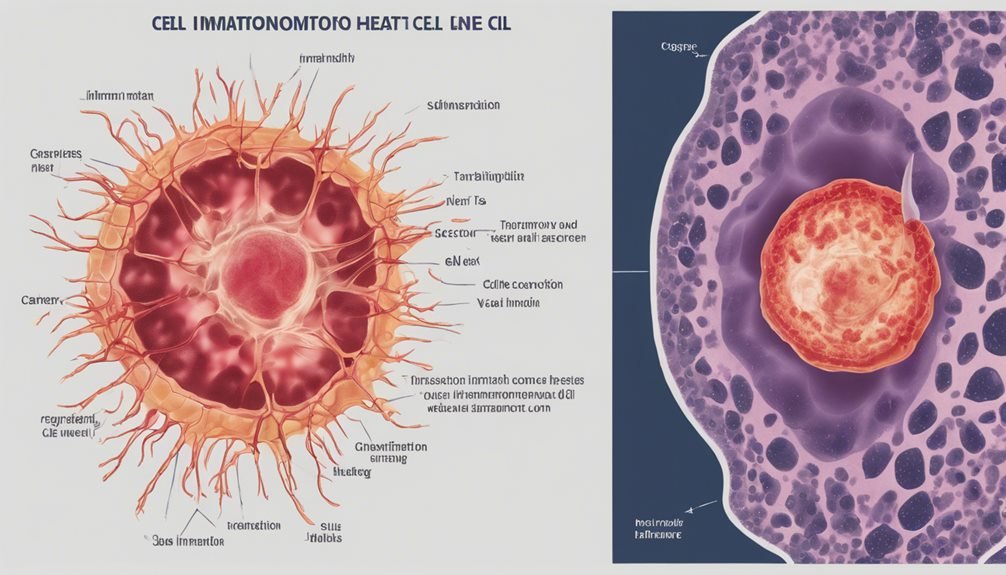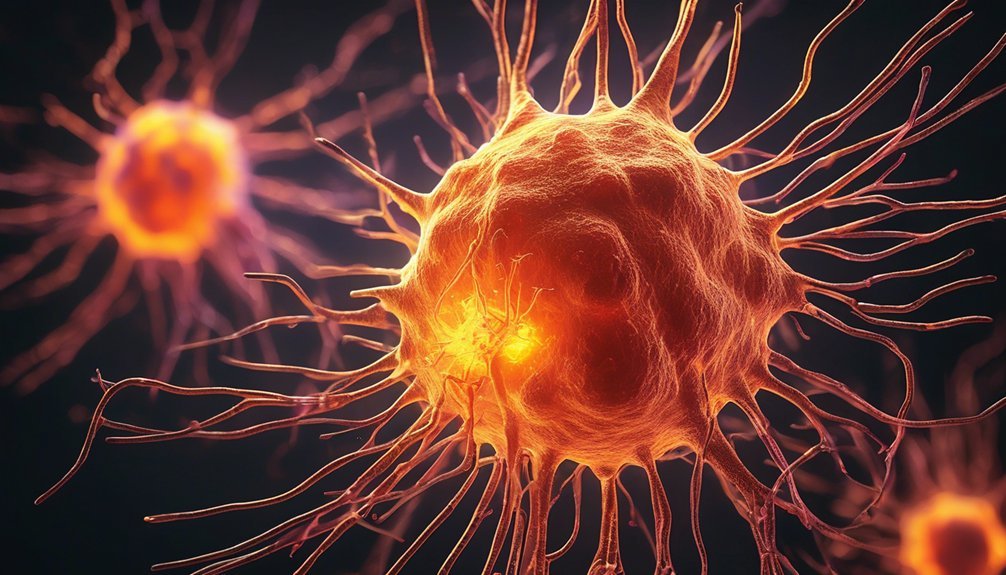You might think inflammation is just the body's natural response to injury or infection, but did you know it could be a key player in cancer development? Imagine how chronic inflammation, lurking beneath the surface for extended periods, could be quietly fueling cancer progression without you even realizing it. By exploring the intricate connection between inflammation and cancer, you may uncover a fascinating link that sheds light on potential preventive measures and targeted treatments.
Key Takeaways
- Chronic inflammation increases cancer risk by promoting DNA damage.
- Inflammatory cytokines like TNF-alpha and IL-6 stimulate tumor growth.
- Inflammation mediators aid metastasis through cell migration.
- Targeting inflammatory pathways can disrupt cancer progression.
- Lifestyle modifications can reduce inflammation levels and lower cancer risk.
Understanding Chronic Inflammation
Chronic inflammation is a complex biological response that can have profound implications on overall health. Inflammatory triggers such as infections, toxins, and stress can set off a cascade of immune responses leading to chronic inflammation. These triggers can be both internal, like obesity or autoimmune diseases, and external, like pollution or smoking. When inflammation persists over time, it can damage tissues and organs, contributing to the development of various diseases.
To combat chronic inflammation, various anti-inflammatory interventions can be employed. These include lifestyle modifications such as regular exercise, a balanced diet rich in fruits and vegetables, stress management techniques like meditation, and adequate sleep. Additionally, certain supplements like omega-3 fatty acids and turmeric have shown anti-inflammatory properties.
Role of Inflammation in Cancer
Have you ever wondered how inflammation plays a crucial role in the development and progression of cancer? Inflammation markers and inflammatory mediators are key players in this process.
Inflammation markers, such as C-reactive protein and interleukin-6, are often elevated in individuals with cancer. These markers indicate the presence of inflammation in the body, which can contribute to the growth and spread of cancer cells.
Inflammatory mediators, including cytokines like tumor necrosis factor-alpha and interleukin-1, are signaling molecules that regulate the inflammatory response. In cancer, these mediators can create a microenvironment that supports tumor growth by promoting cell proliferation, angiogenesis, and metastasis.
Understanding the role of inflammation in cancer is essential for developing targeted therapies that can disrupt the inflammatory pathways driving cancer progression. By targeting inflammation markers and inflammatory mediators, researchers aim to develop treatments that can inhibit the pro-tumorigenic effects of inflammation and improve outcomes for cancer patients.
Inflammatory Cytokines and Cancer
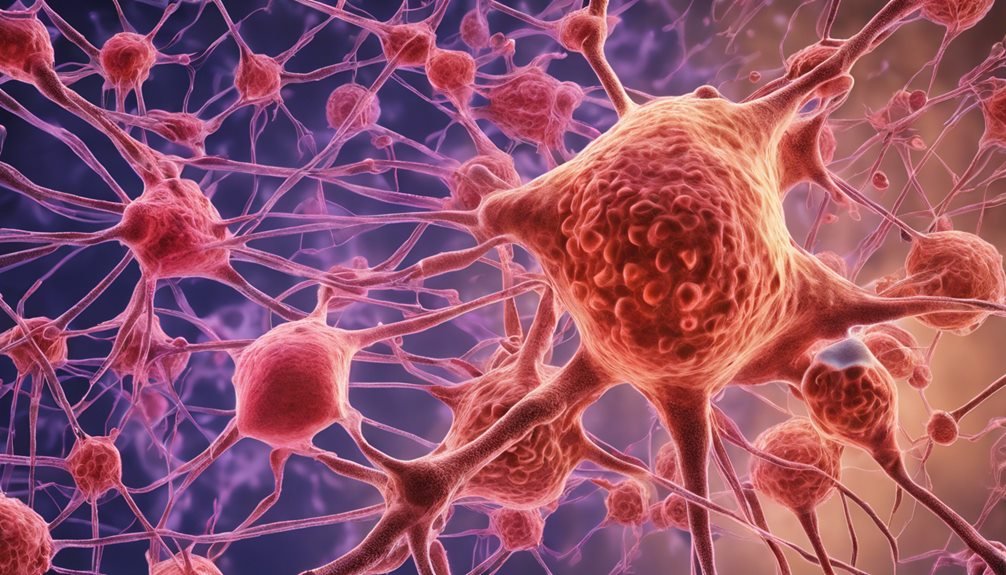
In the context of cancer development and progression, the focus shifts towards the significant impact of inflammatory cytokines. Inflammatory markers play a crucial role in the tumor microenvironment, influencing various aspects of cancer biology. Cytokine signaling, a key mechanism in this process, can drive cancer initiation, progression, and metastasis.
Inflammatory cytokines, such as tumor necrosis factor-alpha (TNF-α), interleukin-6 (IL-6), and interleukin-1 (IL-1), are produced in response to chronic inflammation. These molecules can promote tumor growth by enhancing cell proliferation, angiogenesis, and metastasis. Additionally, they contribute to the suppression of the immune response against cancer cells, allowing tumors to evade detection and destruction.
Studies have shown that high levels of inflammatory cytokines are associated with poor prognosis in various cancer types. Targeting cytokine signaling pathways has emerged as a potential therapeutic strategy to disrupt the pro-tumorigenic effects of inflammation. Understanding the intricate relationship between inflammatory markers and cancer is vital for developing effective treatments that target the inflammatory component of the disease.
Chronic Inflammation and DNA Damage
A significant link exists between persistent inflammation and the induction of DNA damage within the context of cancer development. Chronic inflammation can lead to the production of reactive oxygen and nitrogen species, causing harm to DNA. This damage can result in mutations that may initiate or promote cancer. Inflammatory markers like interleukin-6 and tumor necrosis factor-alpha have been shown to contribute to DNA damage by activating processes that harm DNA strands.
Moreover, chronic inflammation can hinder DNA repair mechanisms, further exacerbating the risk of mutations that can lead to cancer. The impaired DNA repair in the presence of persistent inflammation creates a conducive environment for the accumulation of genetic errors, which can drive the progression of cancer.
Understanding how chronic inflammation influences DNA damage and repair processes is crucial in unraveling the intricate relationship between inflammation and cancer development. By targeting these pathways, researchers aim to develop strategies that could potentially prevent or treat inflammation-induced cancers more effectively.
Cellular Pathways in Cancer Development
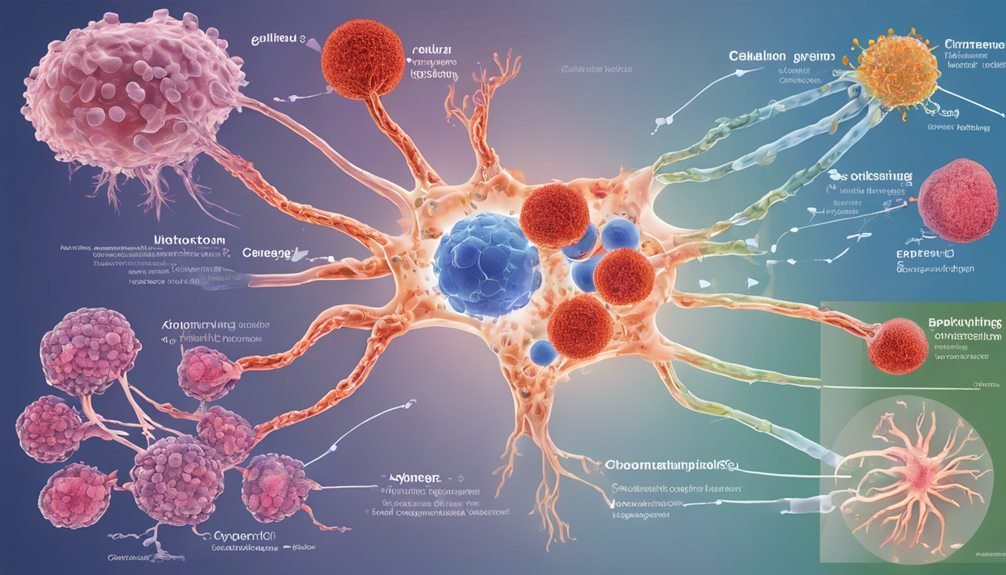
Cellular pathways play a pivotal role in the intricate process of cancer development. Signaling pathways, which are intricate communication networks within cells, regulate crucial processes like cell growth, division, and survival. In cancer, these signaling pathways can become dysregulated, leading to uncontrolled cell growth and tumor formation.
Genetic alterations, such as mutations in key genes, are often responsible for disrupting these signaling pathways. For instance, mutations in genes like TP53 or PTEN can interfere with normal cellular signaling, promoting cancer development.
Understanding these cellular pathways is essential for developing targeted therapies that aim to correct the abnormalities in signaling caused by genetic alterations. By pinpointing the specific pathways that are dysregulated in a particular cancer type, researchers can design drugs that specifically target those pathways, leading to more effective and less toxic treatments.
Inflammation-Induced Mutations in Cells
Pivoting from understanding the dysregulated cellular pathways in cancer development, it's crucial to grasp the impact of inflammation on the genetic makeup of cells. Chronic inflammation can induce cellular mutations through various mechanisms.
One significant way this occurs is through the production of reactive oxygen and nitrogen species, which can cause DNA damage and mutations. These mutations can lead to the activation of oncogenes or the inactivation of tumor suppressor genes, promoting the development of cancer.
Inflammation also stimulates the production of pro-inflammatory cytokines, such as interleukin-6 and tumor necrosis factor-alpha, which can contribute to cellular mutations by affecting DNA repair mechanisms and promoting genomic instability.
Moreover, inflammatory cells like macrophages and neutrophils release enzymes that can damage DNA, further increasing the risk of mutations in cells.
Understanding how inflammation induces cellular mutations is essential in comprehending the link between chronic inflammation and cancer development. By targeting the inflammation mechanisms that drive these mutations, potential therapeutic strategies may be developed to prevent or treat inflammation-induced cancer.
Tumor Microenvironment and Inflammation

Within the intricate landscape of cancer development, the tumor microenvironment plays a pivotal role in shaping the progression and behavior of cancer cells. The tumor microenvironment encompasses various components, including immune cells, fibroblasts, blood vessels, and signaling molecules. Inflammation within this environment can either promote or inhibit cancer progression, depending on the context.
Inflammation in the tumor microenvironment can stimulate the production of cytokines and chemokines, which attract immune cells to the site of the tumor. These immune cells can have both tumor-promoting and tumor-suppressive effects.
For instance, inflammatory mediators like TNF-alpha and IL-6 can promote cancer cell survival, proliferation, and invasion. On the other hand, immune cells such as cytotoxic T cells and natural killer cells have the potential to recognize and eliminate cancer cells, thus inhibiting cancer progression.
Understanding the complex interplay between the tumor microenvironment, immune response, inflammation, and cancer progression is crucial for developing targeted therapies that can exploit the immune system to fight cancer effectively.
Chronic Inflammation and Angiogenesis
In the context of cancer development, chronic inflammation can significantly influence the process of angiogenesis, which is the formation of new blood vessels. Angiogenesis plays a crucial role in tumor growth and metastasis, providing the necessary nutrients and oxygen for cancer cells to thrive. Chronic inflammation contributes to this process by promoting the secretion of pro-angiogenic factors, stimulating endothelial cell proliferation, and destabilizing blood vessels within the tumor microenvironment.
| Angiogenesis Inhibition | Inflammation Resolution |
|---|---|
| Targeting VEGF signaling pathways | Resolving persistent inflammatory responses |
| Blocking angiogenic factors | Promoting anti-inflammatory cytokines |
| Using anti-angiogenic therapies | Limiting leukocyte recruitment |
| Disrupting tumor blood vessel formation | Enhancing immune regulation |
| Inhibiting endothelial cell migration | Supporting tissue repair mechanisms |
Immune System Response to Inflammation
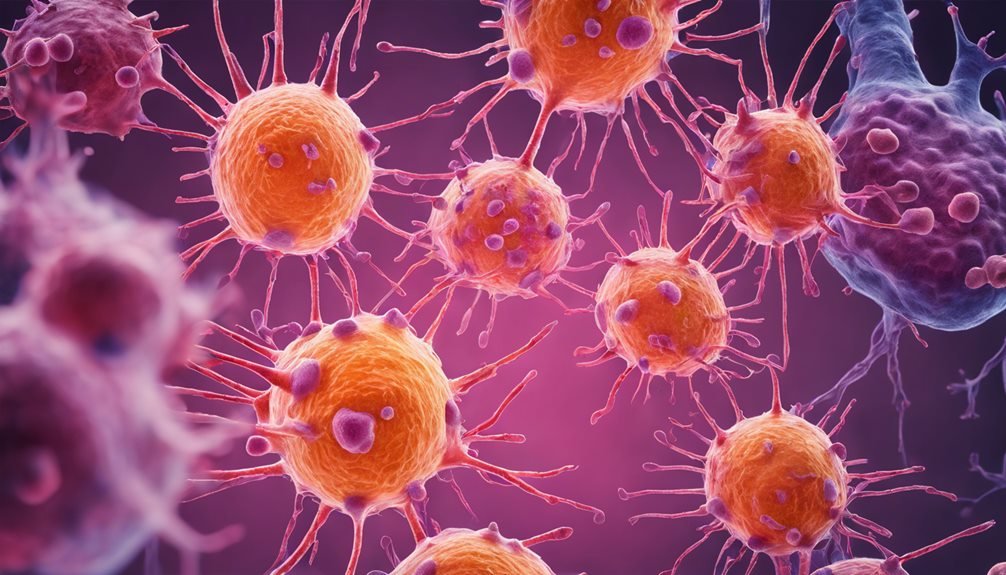
When faced with chronic inflammation, the immune system mounts a complex response aimed at restoring tissue homeostasis and eliminating the source of inflammation. This response involves a series of intricate mechanisms orchestrated to maintain the delicate balance within the body.
Here's how the immune system responds to inflammation:
- Recognition of Inflammatory Triggers: Immune cells detect and respond to signals released by damaged tissues or invading pathogens, initiating the inflammatory response to contain and eliminate the threat.
- Immune Cell Activation and Recruitment: Inflammatory signals activate immune cells, such as macrophages and neutrophils, which migrate to the site of inflammation to engulf pathogens and remove debris.
- Immune Modulation and Resolution: Specialized immune cells, like regulatory T cells, help modulate the inflammatory response, preventing excessive tissue damage and promoting resolution of inflammation once the threat is neutralized.
Understanding these processes highlights the intricate interplay between inflammation and the immune system, emphasizing the importance of maintaining a balanced immune response to prevent chronic inflammation and its potential link to cancer development.
Inflammation and Metastasis
Upon encountering chronic inflammation, the intricate relationship between inflammation and cancer extends to the process of metastasis. Inflammation plays a crucial role in promoting the spread of cancer cells to distant sites in the body, a process known as metastasis.
The link between inflammation and metastasis is supported by various studies showing that inflammatory responses within the tumor microenvironment can enhance the ability of cancer cells to invade surrounding tissues and migrate to other parts of the body.
Inflammation and the immune response not only contribute to the initiation and progression of cancer but also play a significant role in the metastatic process. Inflammatory markers, such as cytokines and chemokines, can create a favorable environment for cancer cells to break away from the primary tumor, enter the bloodstream or lymphatic system, and establish secondary tumors at distant sites.
Understanding the role of inflammation in metastasis is crucial for developing targeted therapies that can disrupt this process and improve cancer treatment outcomes.
Chronic Inflammation and Cancer Risk Factors

Experiencing chronic inflammation can significantly elevate your risk of developing cancer by creating a persistent environment conducive to tumorigenesis. To understand how chronic inflammation contributes to cancer risk, consider the following factors:
- Inflammation Markers: Constant activation of inflammatory pathways in the body can lead to DNA damage, promoting mutations that may initiate cancer development. Inflammation markers like C-reactive protein (CRP) and interleukin-6 (IL-6) are often elevated in individuals with chronic inflammation, indicating a potential increased risk for cancer.
- Immune System Suppression: Prolonged inflammation can suppress the immune system, compromising its ability to detect and destroy cancer cells. This weakened immune response allows cancer cells to proliferate and evade immune surveillance, further enhancing the risk of tumor formation.
- Cancer Prevention Strategies: Understanding the link between chronic inflammation and cancer risk underscores the importance of adopting lifestyle choices that can help prevent inflammation. Maintaining a healthy weight, regular physical activity, a balanced diet rich in fruits and vegetables, and avoiding tobacco can all contribute to reducing inflammation levels and lowering the risk of cancer development.
Therapeutic Strategies Targeting Inflammation
To effectively combat the detrimental effects of chronic inflammation on cancer development, therapeutic strategies targeting inflammation have emerged as crucial components in cancer treatment and prevention. Implementing an anti-inflammatory diet rich in fruits, vegetables, whole grains, and omega-3 fatty acids can help reduce inflammation and support overall health. Additionally, targeted therapies that specifically inhibit inflammatory pathways or immune checkpoints have shown promising results in managing inflammation-related cancers.
| Therapeutic Strategies | Description | Benefits |
|---|---|---|
| Anti-inflammatory diet | Focuses on foods that help reduce inflammation in the body. | Supports overall health and well-being. |
| Targeted therapies | Specifically target inflammatory pathways or immune checkpoints. | Can effectively manage inflammation-related cancers. |
Frequently Asked Questions
Can Chronic Inflammation Directly Cause Cancer Cells to Spread to Other Parts of the Body?
Yes, chronic inflammation can indeed directly cause cancer cells to spread to other parts of the body. This process is linked to genetic mutations that occur due to the sustained inflammatory response.
Additionally, the tumor microenvironment created by chronic inflammation can facilitate the invasion and metastasis of cancer cells to distant sites.
Understanding these mechanisms is crucial in developing targeted therapies to combat cancer progression initiated by chronic inflammation.
How Does the Microbiome Contribute to Chronic Inflammation and Cancer Development?
How does the microbiome impact chronic inflammation and cancer development?
Well, the microbiome plays a crucial role in maintaining immune response balance. When dysbiosis occurs, the microbiome's composition shifts, leading to inflammation. This chronic inflammation can then influence cancer development by affecting cell proliferation and DNA damage repair mechanisms. Understanding how the microbiome modulates immune responses is key to unraveling its intricate role in cancer progression.
Are There Specific Dietary Factors That Can Exacerbate Chronic Inflammation and Increase Cancer Risk?
To support gut health and reduce inflammation, focus on antioxidant-rich diets. Emphasize fruits, vegetables, nuts, and seeds. Incorporate foods like berries, leafy greens, and fatty fish.
Limit processed foods, sugary drinks, and excessive red meat consumption. Be mindful of portion sizes and balance your meals with whole grains and lean proteins.
Hydrate well and prioritize regular physical activity to further promote overall well-being and lower cancer risk.
Can Stress and Mental Health Issues Play a Role in Chronic Inflammation and Cancer Progression?
Stress and mental health can indeed impact inflammation and cancer progression. Genetics can predispose you to inflammation, while lifestyle choices can further exacerbate it. When you're stressed or struggling mentally, your body's inflammatory response can go into overdrive, potentially fueling cancer growth. Taking proactive steps to manage stress and improve mental health can help reduce chronic inflammation, potentially lowering your cancer risk.
Is There a Link Between Chronic Inflammation and the Development of Drug Resistance in Cancer Treatment?
When it comes to the link between chronic inflammation and drug resistance in cancer treatment, understanding the immune response plays a crucial role. Chronic inflammation can alter the tumor microenvironment, impacting how cancer cells respond to treatment. This can lead to the development of drug resistance, limiting the effectiveness of various treatment options available. Recognizing this connection can help in developing new strategies to overcome drug resistance and improve patient outcomes.
Conclusion
So, there you have it – chronic inflammation and cancer are like two peas in a pod, wreaking havoc on your body. But hey, who needs a healthy immune system anyway, right? Keep indulging in those inflammatory triggers and watch as your cells mutate and multiply uncontrollably. But don't worry, targeted therapies are always there to clean up the mess. So go ahead, keep ignoring the inflammation – what's the worst that could happen?
